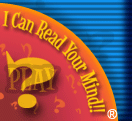|
The Radica Games pocket version of the 20Q Artificial Intelligence (A.I.), produced under license from 20Q.net Inc., has been quite a hit in North America.
Now 20Q and Radica are working to produce new versions of the pocket game in other languages. In the works are versions in French, Spanish, German, Italian and Chinese.
At first glance, producing versions in other languages may seem to be a simple matter of translating the objects and the questions. But, there are deeper issues that complicate such an
approach from acheiving satisfactory results. Learning new languages is a challenge for anyone! "The game has a cultural bias," said Robin Burgener, inventor of the A.I. technology that is at the heart of the game.
"Since everything the game knows is entered by people who play the game, if everyone who plays the game is from North America, the game will think like a North American and this may not work very well if the player is Chinese."
An example of the kind of issues he is referring to is the word 'spine'. If your first language is English and you are thinking of a book, the A.I. may ask if the object you're thinking about has a spine.
You will probably answer 'yes'. But in other languages, the equivalent word for spine never refers to the binding of a book, only to the chain of bones that all vertebrates possess.
If the A.I. asks if the book they are thinking about has a spine, they will likely answer 'no', the A.I. will become confused, and probably not guess the correct object. This is just one of the challenges that contributes to the complexities
of translating an AI game that has a purely linguistic basis. Over time and through play, the 20Q A.I. will learn about other cultural differences and will adjust. "The only way for the game to work well for a given culture is for a lot
of people from that culture to play," observes Burgener. "Even if you wanted to manually 'fix' the database, it isn't really practical ... it would take a full time employee several years to make the changes
and that would affect the 20Q A.I.'s collective knowledge learning ability." Says Burgener, "20Q's uniqueness is that it is not an expert system; it has learned from human interaction and play."
20Q.net has made the foreign language versions of the game available for online play and is actively encouraging visitors to the site to play the other languages and help train the A.I.
"Each of the languages now has its own knowledgebase, and they are learning the differences between English and other cultures," said Mr. Burgener. "I now suppose I have some understanding
of how a farmer feels waiting for the seeds he planted to ripen into crops." Play our new language versions of 20Q online at http://www.20q.net and help our crops grow up healthy--and smart!
| 



